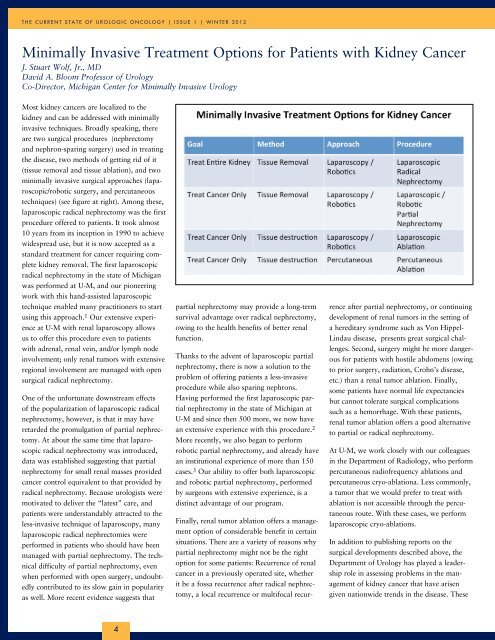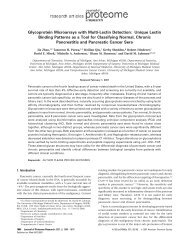uRoloGIC onColoGy - University of Michigan Health System
uRoloGIC onColoGy - University of Michigan Health System
uRoloGIC onColoGy - University of Michigan Health System
You also want an ePaper? Increase the reach of your titles
YUMPU automatically turns print PDFs into web optimized ePapers that Google loves.
The CurrenT STaTe <strong>of</strong> urologiC onCology | iSSue 1 | winTer 2012<br />
minimally invasive treatment options for Patients with Kidney cancer<br />
J. Stuart Wolf, Jr., MD<br />
David A. Bloom Pr<strong>of</strong>essor <strong>of</strong> Urology<br />
Co-Director, <strong>Michigan</strong> Center for Minimally Invasive Urology<br />
most kidney cancers are localized to the<br />
kidney and can be addressed with minimally<br />
invasive techniques. Broadly speaking, there<br />
are two surgical procedures (nephrectomy<br />
and nephron-sparing surgery) used in treating<br />
the disease, two methods <strong>of</strong> getting rid <strong>of</strong> it<br />
(tissue removal and tissue ablation), and two<br />
minimally invasive surgical approaches (laparoscopic/robotic<br />
surgery, and percutaneous<br />
techniques) (see figure at right). Among these,<br />
laparoscopic radical nephrectomy was the first<br />
procedure <strong>of</strong>fered to patients. it took almost<br />
10 years from its inception in 1990 to achieve<br />
widespread use, but it is now accepted as a<br />
standard treatment for cancer requiring complete<br />
kidney removal. the first laparoscopic<br />
radical nephrectomy in the state <strong>of</strong> michigan<br />
was performed at U-m, and our pioneering<br />
work with this hand-assisted laparoscopic<br />
technique enabled many practitioners to start<br />
using this approach. 1 our extensive experience<br />
at U-m with renal laparoscopy allows<br />
us to <strong>of</strong>fer this procedure even to patients<br />
with adrenal, renal vein, and/or lymph node<br />
involvement; only renal tumors with extensive<br />
regional involvement are managed with open<br />
surgical radical nephrectomy.<br />
one <strong>of</strong> the unfortunate downstream effects<br />
<strong>of</strong> the popularization <strong>of</strong> laparoscopic radical<br />
nephrectomy, however, is that it may have<br />
retarded the promulgation <strong>of</strong> partial nephrectomy.<br />
At about the same time that laparoscopic<br />
radical nephrectomy was introduced,<br />
data was established suggesting that partial<br />
nephrectomy for small renal masses provided<br />
cancer control equivalent to that provided by<br />
radical nephrectomy. Because urologists were<br />
motivated to deliver the “latest” care, and<br />
patients were understandably attracted to the<br />
less-invasive technique <strong>of</strong> laparoscopy, many<br />
laparoscopic radical nephrectomies were<br />
performed in patients who should have been<br />
managed with partial nephrectomy. the technical<br />
difficulty <strong>of</strong> partial nephrectomy, even<br />
when performed with open surgery, undoubtedly<br />
contributed to its slow gain in popularity<br />
as well. more recent evidence suggests that<br />
4<br />
partial nephrectomy may provide a long-term<br />
survival advantage over radical nephrectomy,<br />
owing to the health benefits <strong>of</strong> better renal<br />
function.<br />
thanks to the advent <strong>of</strong> laparoscopic partial<br />
nephrectomy, there is now a solution to the<br />
problem <strong>of</strong> <strong>of</strong>fering patients a less-invasive<br />
procedure while also sparing nephrons.<br />
Having performed the first laparoscopic partial<br />
nephrectomy in the state <strong>of</strong> michigan at<br />
U-m and since then 500 more, we now have<br />
an extensive experience with this procedure. 2<br />
more recently, we also began to perform<br />
robotic partial nephrectomy, and already have<br />
an institutional experience <strong>of</strong> more than 150<br />
cases. 3 our ability to <strong>of</strong>fer both laparoscopic<br />
and robotic partial nephrectomy, performed<br />
by surgeons with extensive experience, is a<br />
distinct advantage <strong>of</strong> our program.<br />
finally, renal tumor ablation <strong>of</strong>fers a management<br />
option <strong>of</strong> considerable benefit in certain<br />
situations. there are a variety <strong>of</strong> reasons why<br />
partial nephrectomy might not be the right<br />
option for some patients: recurrence <strong>of</strong> renal<br />
cancer in a previously operated site, whether<br />
it be a fossa recurrence after radical nephrectomy,<br />
a local recurrence or multifocal recur-<br />
rence after partial nephrectomy, or continuing<br />
development <strong>of</strong> renal tumors in the setting <strong>of</strong><br />
a hereditary syndrome such as Von Hippellindau<br />
disease, presents great surgical challenges.<br />
second, surgery might be more dangerous<br />
for patients with hostile abdomens (owing<br />
to prior surgery, radiation, crohn’s disease,<br />
etc.) than a renal tumor ablation. finally,<br />
some patients have normal life expectancies<br />
but cannot tolerate surgical complications<br />
such as a hemorrhage. With these patients,<br />
renal tumor ablation <strong>of</strong>fers a good alternative<br />
to partial or radical nephrectomy.<br />
At U-m, we work closely with our colleagues<br />
in the Department <strong>of</strong> radiology, who perform<br />
percutaneous radi<strong>of</strong>requency ablations and<br />
percutaneous cryo-ablationa. less commonly,<br />
a tumor that we would prefer to treat with<br />
ablation is not accessible through the percutaneous<br />
route. With these cases, we perform<br />
laparoscopic cryo-ablations.<br />
in addition to publishing reports on the<br />
surgical developments described above, the<br />
Department <strong>of</strong> Urology has played a leadership<br />
role in assessing problems in the management<br />
<strong>of</strong> kidney cancer that have arisen<br />
given nationwide trends in the disease. these

















